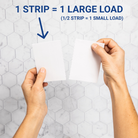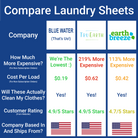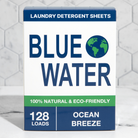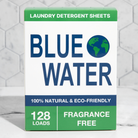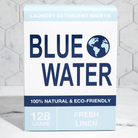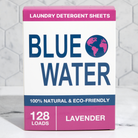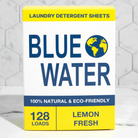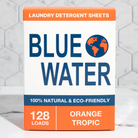Plastic-Free Laundry Detergent
Key Takeaways:
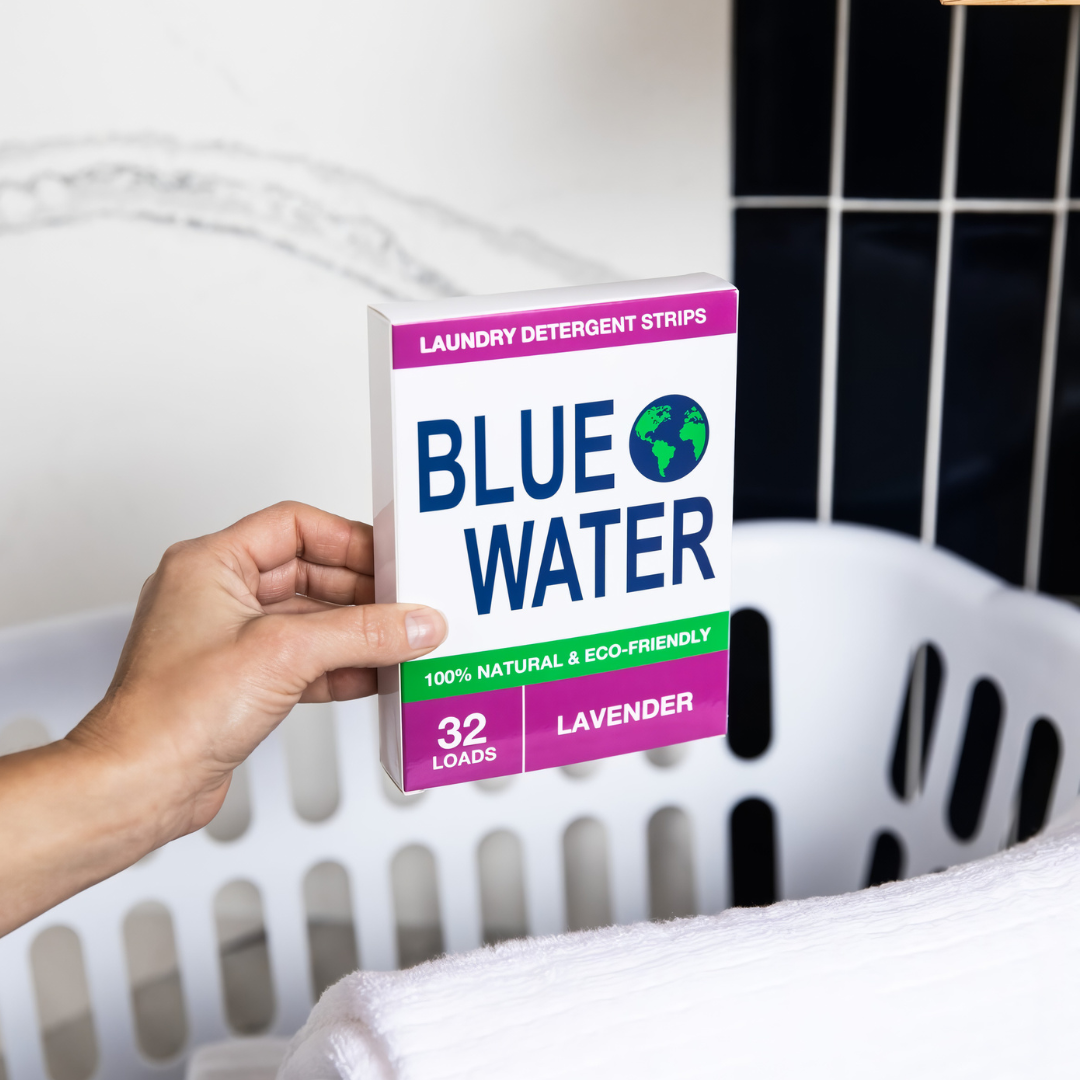
At Blue Water, we are passionate about creating solutions that align with the needs of environmentally conscious consumers. Our compact, biodegradable detergent sheets are designed to provide a cleaner, greener alternative, helping you reduce waste without compromising on effectiveness.
Plastic-free laundry detergents are cleaning products designed to minimize environmental impact by eliminating the use of plastic in their formulation and packaging. Unlike conventional detergents, which often come in plastic containers or include microplastics as ingredients, plastic-free alternatives focus on natural, biodegradable components and sustainable packaging materials.
These detergents are available in various forms, including powder, strips, tablets, and concentrated liquids. The goal is to provide the same level of cleanliness and freshness for your clothes while reducing waste and avoiding harmful chemicals that can pollute waterways.
Switching to plastic-free laundry detergents benefits both the environment and your household. Here are some compelling reasons to make the change:
The laundry industry contributes significantly to the billions of plastic items discarded annually, many of which take centuries to decompose. Switching to plastic-free detergents eliminates single-use packaging from your routine, directly reducing your household’s waste footprint. This small change helps combat the growing problem of landfills and ocean pollution caused by discarded plastics.
Microplastics, tiny plastic particles in some cleaning products, often escape filtration systems and end up in rivers, lakes, and oceans. Marine life ingests these particles, disrupting ecosystems and entering the food chain. Choosing plastic-free detergents that avoid microplastic ingredients protects aquatic environments and ensures cleaner waterways.
Plastic-free laundry detergents often prioritize sustainable production methods, using renewable energy and responsibly sourced ingredients. Packaging materials such as cardboard, metal tins, or compostable wraps are designed to break down naturally, reducing overall environmental impact. Opting for these products helps support brands and practices that align with a greener future.
Many conventional detergents contain synthetic fragrances, dyes, and harsh chemicals that can irritate sensitive skin or cause allergic reactions. Plastic-free options often use non-toxic, hypoallergenic ingredients, providing a safer alternative for you and your loved ones. This is especially important for families with children or individuals prone to skin sensitivities.
Every purchase of a plastic-free detergent is a vote for sustainability, encouraging companies to prioritize the environment in their product designs. Over time, consumer demand for eco-friendly options drives innovation, leading to better, more accessible products. Supporting these efforts can inspire widespread changes in the industry, benefiting the planet on a larger scale.

Plastic-free laundry detergents come in various forms to suit different preferences and needs. Here are the most common types:
Laundry strips or sheets are ultra-light, pre-measured sheets that dissolve entirely in water, leaving no residue or waste behind. These strips are often packaged in biodegradable cardboard, making them an excellent space-saving and eco-friendly alternative to bulky plastic bottles. They are particularly popular among travelers and those with limited storage space due to their compact design and ease of use.
Plastic-free detergent tablets or pods are gaining popularity as a convenient and sustainable alternative to traditional plastic-encased pods. These are pre-measured to ensure you use just the right amount of detergent, reducing waste and preventing excess product from being poured into waterways. They typically come in plastic-free packaging, such as compostable paper or tin containers, making them both effective and eco-friendly for busy households.
Soap nuts, also called soapberries, are dried fruit shells that naturally produce soap (saponins) when agitated in water. They are entirely biodegradable, reusable for multiple washes, and compostable after use, making them a zero-waste solution. Soap nuts are a great choice for those looking for an all-natural, chemical-free alternative to conventional detergents.
At Blue Water, we believe your laundry routine should work for you—and the planet. That’s why we created Blue Water Laundry Detergent Sheets. With plastic-free packaging and a formula that’s tough on stains but gentle on the skin, we make it easy to care for your clothes and the environment.
When you choose Blue Water, you’re not just choosing clean clothes—you’re choosing a cleaner future. Try Blue Water Laundry Detergent Sheets today. Clean never felt so good.
With the rise in eco-friendly products, it can be challenging to identify genuinely plastic-free detergents. Here’s how to ensure you’re making an informed choice:
The first sign of a plastic-free detergent is its packaging. Look for materials like cardboard, kraft paper, or metal tins, which can be recycled or composted. Beware of deceptive packaging that uses plastic linings or laminates hidden within seemingly eco-friendly exteriors.
Microplastics can hide in ingredient lists under names like “polyethylene” or “polypropylene.” These tiny plastic particles do not dissolve and can pollute water systems. Choose detergents with simple, plant-based ingredients that break down naturally in the environment.
Certifications like “Plastic-Free,” “EcoCert,” or “USDA Biobased” assure that the product meets eco-friendly standards. Third-party audits and rigorous testing often back these labels. Always verify the authenticity of these certifications, as some brands might use vague or unregulated claims.
A genuinely plastic-free brand is transparent about its materials, production methods, and sustainability goals. Check the company’s website for detailed information or sustainability reports. Brands committed to environmental responsibility often invest in innovative packaging and fair manufacturing practices.
Many pods marketed as “eco-friendly” may still have plastic-based coatings that break down into microplastics. Instead, choose pods specifically labeled as biodegradable and plant-based. If unsure, consider other formats like strips or powders to avoid the risk entirely.
Reviews from eco-conscious customers often highlight whether a product lives up to its plastic-free claims. Look for feedback on both the packaging and the detergent's performance. Consumer experiences can alert you to hidden issues, such as misleading labels or subpar cleaning results.
Switching to plastic-free laundry detergents is just the beginning. To create a completely plastic-free laundry routine, consider adopting these additional eco-friendly practices:
Even when using plastic-free detergents, synthetic fabrics like polyester and nylon release tiny microfibers during washing. These microfibers can pass through water treatment plants and pollute rivers and oceans. A specialized microfiber wash bag traps these particles, allowing you to dispose of them responsibly and prevent environmental harm.
Plastic-packaged fabric softeners often contain synthetic chemicals that coat your clothes and pollute water systems. White vinegar is a great natural alternative that softens fabrics and removes odors without leaving residues. Wool dryer balls are another excellent choice; they reduce drying time, soften fabrics naturally, and can be reused for years.
Using cold water saves energy and extends the life of your clothing by reducing wear and tear. Many plastic-free detergents are designed to work effectively in cold water, making them an environmentally friendly choice. Additionally, washing in cold water helps reduce the number of microfibers released from synthetic fabrics.
Air-drying your clothes reduces energy consumption compared to using an electric dryer. It also eliminates the need for disposable plastic dryer sheets, often used to combat static electricity. Line drying outdoors can add a fresh scent to your clothes while preserving their quality over time.
If you have leftover plastic detergent bottles, don’t throw them away; instead, reuse them creatively. They can be used to store bulk-bought detergent, hold cleaning supplies, or even as watering cans. By repurposing these items, you extend their usability and reduce waste.
Plastic laundry baskets tend to break over time, leading to unnecessary waste. Opt for sturdy, long-lasting alternatives made from materials like bamboo, wicker, or cloth. These options reduce plastic use and add a natural, aesthetically pleasing touch to your home.
Zero-waste and bulk stores often sell detergents without packaging or in refillable containers. Bring your own reusable jars, bottles, or bags to purchase the exact amount you need. This approach minimizes packaging waste and supports businesses prioritizing sustainability.
Replace common plastic laundry tools like scoops, pegs, and hangers with sustainable alternatives. Wooden pegs and hangers are durable, biodegradable, and free from plastic. Stainless steel scoops and hangers offer another long-lasting solution, reducing the need for disposable items.
Read also:
The best plastic-free laundry soap will vary depending on your individual needs. One popular option is Blue Water laundry detergent sheets, known for their eco-friendly packaging and effective cleaning capabilities. These sheets are made from plant-based, biodegradable ingredients and are available in zero-waste formats.
Many conventional laundry detergents contain microplastics or synthetic polymers that act as cleaning agents or fillers. Additionally, plastic packaging significantly contributes to plastic waste in most detergent brands. Choosing plastic-free products ensures that both the detergent and packaging are eco-friendly.
Tide is safe for cleaning clothes but contains synthetic chemicals that may irritate sensitive skin or harm the environment. It includes ingredients like surfactants and fragrances, which can be harsh. For a safer alternative, choose plant-based detergents with fewer additives.
Yes, Tide Pods are coated in a water-soluble plastic called PVA (polyvinyl alcohol), which can release microplastics into the environment. While marketed as dissolvable, PVA may not fully break down in all water systems. Look for plastic-free detergent pods made with biodegradable materials instead.
Clothing made from synthetic materials like polyester, nylon, and acrylic contains plastic fibers. These fabrics shed microplastics during washing, contributing to environmental pollution. Opt for natural fibers like cotton, hemp, or wool to avoid plastic in clothing.
Yes, you can use white vinegar as a natural alternative to laundry detergent. It effectively removes odors, softens fabrics, and can help prevent color fading. However, vinegar is not a strong stain remover and works best when combined with other natural cleaning agents like baking soda for heavily soiled loads.
Subscribe to get tips on zero waste and the first look at new product launches.
